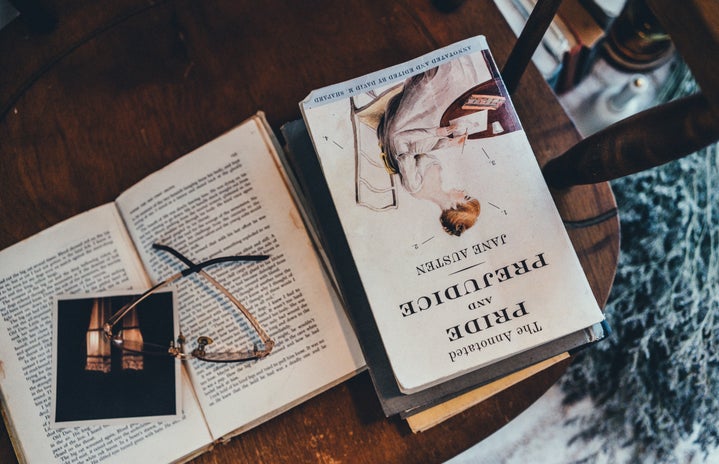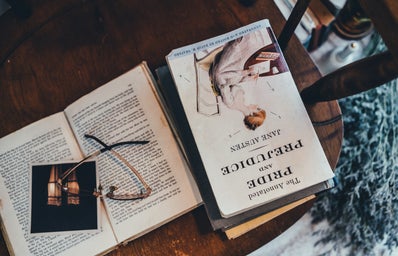I recently decided to have a bit of a Pride and Prejudice marathon, because I just read the book for the first time. I’m just beginning on my Jane Austen journey, but I think my recent bender led me to some interesting insights about the world of Pride and Prejudice adaptations. I’m ranking these based on their accuracy, quality and how much I enjoyed them, so hopefully even if you disagree you can still appreciate some of my opinions.
- Pride and Prejudice (2005)
-
I know this may be a controversial opinion, but I enjoyed the 2005 adaptation of Pride and Prejudice, with Keira Knightley and Matthew Macfadyen, more than the 1995 BBC series. Now, the BBC series is closest to the book hands down – there are many things that the 2005 version left out or changed – but given that they took six hours of content and paired it down to two, it’s understandable. This movie is lush, romantic, and still manages to capture the sentiment behind Pride and Prejudice in a third of the time. If I’m being completely honest I prefer Matthew Macfadyen’s Darcy to Colin Firth’s, which is one of the big reasons why this movie got the top spot.
When I’m looking for a fix of Pride and Prejudice, this adaptation is my go-to. Maybe it’s because it’s easier to consume (who really has six hours straight to sit down and watch a show?), or maybe it’s because of the chemistry the actors have that I just didn’t feel in the 1995 version. I know, I know, I clearly don’t have the eye for Colin Firths’ oh-so-subtle looks.
I understand why so many people like this movie less: at its core this movie feels like a romanticization of the original Pride and Prejudice story, and it lacks the subtlety that both the book and the 1995 series boast. And maybe that’s part of why I liked it so much, I’m a sucker for cheesy romance movies— and this one hits the mark perfectly.
This is the movie I show people who don’t know anything about Pride and Prejudice. It’s the perfect way to get into the world of the novel without being bogged down by too many of the subtleties. And I stand by it as the most accessible adaptation of Jane Austen’s legendary classic.
- Pride and Prejudice (1995)
-
The short TV mini-series starring Colin Firth and Jennifer Ehle is often heralded as the most definitive adaptation of the original Jane Austen novel, and I don’t disagree.
This series earns every point in terms of accuracy. I actually watched it while reading through the book and it was nearly scene-for-scene and word-for-word the same. Despite this, I found I enjoyed it less than the 2005 version. And as this is my ranking, I’m sticking with my gut.
The main problem I had with this adaptation is Colin Firth’s Darcy. I love Colin Firth (I mean, who doesn’t?) but his portrayal of Darcy was so stoic and unfeeling it was hard to believe there was any attraction between the characters at all. Of course, I know that that is largely the point, but at least in the book we had an insight into what the characters were thinking, and as such knew the extent of Darcy’s feelings for Elizabeth before his ill-advised first proposal. In the 2005 adaptation, I felt like Matthew Macfadyen let us in on just enough of Darcy’s emotions so that we could grasp this, but for me, Colin Firth’s Darcy is too little, too late.
I loved Jennifer Ehle as Liz Bennet, and I thought she did a better job capturing the character than Kiera Knightley did (though I also loved Kiera Knightley as Liz). Generally speaking, the side characters in this version were better than those in the 2005 adaptation (Mr. Collins made me cringe more than he did in the book, if that’s even possible), but that wasn’t quite enough to convince me to give it the top spot.
If you missed the reading for class and you’re looking for a way to get the Pride and Prejudice story that isn’t the actual book, this is for sure your best bet – you can’t beat its accuracy. This series is a classic for a reason, and a very close second. - Pride and Prejudice and Zombies
-
Now I am a pretty serious Lily James fan, (Guernsey Literary and Potato Peel Pie Society anyone?) so I was excited to see her play Lizzy in this adaptation. Of course, this Pride and Prejudice also features a fun new element: zombies. Because of this, it can’t compare to the other adaptations on this list in terms of accuracy, but that wasn’t the point of this movie. It achieves its goal in a highly entertaining way, despite not being an accurate adaptation by any means. Badass girls, epic fight scenes, and daggers strapped to thighs. I mean, Liz full-on attacking Darcy with a fire poker during his proposal? Iconic.
This movie has a lot to accomplish in a mere 100 minutes, and given that the conflict in this movie isn’t just Elizabeth and Darcy’s relationship, but also fighting a zombie apocalypse, it’s inevitable that much was missed. Because of this, the movie did feel rushed, and I think it could have benefitted from at least a two-hour runtime. Looking at it as a Pride and Prejudice adaptation is unfair though, as it strays far enough from the original that it’s more of a fun action movie than anything else.
- Bride and Prejudice
-
The two words that came to mind while watching this movie were colourful and fun. Instead of the addition of zombies, this movie adds in a ton of singing and dancing, making it a great way to watch the Pride and Prejudice story unfold as a musical set in Amritsar, India.
Despite the fact that this movie changes a lot of the original story, it still starts with a version of the iconic first line: “All mothers think that any single guy with big bucks must be shopping for a wife.” And that summarizes the fun energy of this movie pretty well.
A few fun features of this movie include a gospel choir accompanied dance number on the beach, Alexis Bledel as Georgiana Darcy, and one Mr. Kholi, obsessed with ‘Amrika’ instead of Lady Catherine de Bourg.
This is by no means a comprehensive ranking, there are more Pride and Prejudice adaptations out there than I can even count. Luckily, in each of these adaptations, Mr. Collins is as odious as ever, and I am thoroughly pleased. Not with Mr. Collins, but that’s the point.



